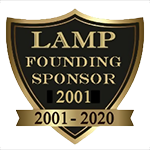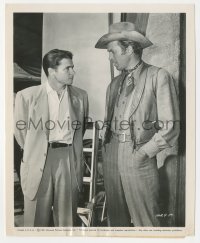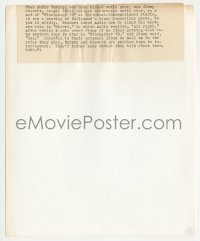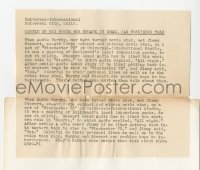eMoviePoster.com
Find similar items:
AUDIE MURPHY/JAMES STEWART AUDIE MURPHY/JAMES STEWART 8x10 OR search current auctions Auction History Result 5j1727 AUDIE MURPHY/JAMES STEWART 8.25x10 still 1950 two big movie men engage in small talk! Date Sold 11/21/2023Sold For: Login or Register to see sold price. An Original Vintage 8 1/4" x 10" [21 x 25 cm] Still (Learn More) Audie Murphy was an actor from the 1940s to the 1960s. He was the most decorated American combat soldier of World War II. After Murphy played himself in "To Hell and Back" he went on to a long career in movies, marred by his personal difficulties (at least partially a result of his war experiences, though it is noted that he had mood swings even as a child). Some of his movies include: Texas, Brooklyn and Heaven, The Kid from Texas, The Red Badge of Courage, Night Passage, and Apache Rifles. He passed away in 1971 at the age of 46 when the private plane he was a passenger in crashed. AND Jimmy Stewart was born James Maitland Stewart in Indiana, Pennsylvania in 1908, where his family had owned a hardware store for three generations, and he was expected to take over the family business someday. He wanted to go to the Naval Academy to become a pilot, but his dad made him go to Princeton instead, where he got involved in drama, and he was also head cheerleader. He joined the University Players, an intercollegiate summer stock company in 1932 (the year before, Henry Fonda and Margaret Sullavan had become members, and Stewart became good friends with both, which would prove important to Stewart's career). Stewart followed Fonda and Sullavan to New York, where he got some minor roles in Broadway plays, and his roommate was Fonda, who had had a three month marriage to Sullavan. Fonda and Sullavan went to Hollywood, and helped Stewart get noticed by MGM, who signed him to a contract after a screen test. He had minor roles in ten movies before he finally got a more substantial part in After the Thin Man in 1936. That same year old pal Sullavan insisted he be given the lead opposite her in Next Time We Love. She also got him hooked up with top agent Leland Hayward (who she later married). In 1938 he starred in Frank Capra's You Can't Take It With You, which won the Best Picture Oscar, and made him a major star. The following year was an incredible one for Stewart! He starred in Capra's Mr. Smith Goes To Washington (nominated for the Best Actor Academy Award for this film; after Gary Cooper turned down the role), and also Destry Rides Again (opposite Marlene Dietrich). The following year was equally great, for he both starred in Ernst Lubitch's marvelous The Shop Around the Corner, opposite his devoted friend Margaret Sullavan, and also The Philadelphia Story, where he won the Best Actor Oscar (and his father displayed it in the front window of their hardware store!). Stewart was the first major star to enter the military in World War II (he did so before Pearl Harbor). He was at first rejected for being underweight (he was 6' 3" and only 138 pounds!), and he embarked on a body building program to gain weight, which he was able to do. He had realized his boyhood dream of flying by becoming a pilot in 1935, and he became an instructor pilot in the military. He begged to be allowed to fly combat missions, and he did so in 1943, becoming a major, and by the end of the war he was a colonel, having risen from private to colonel in four years. He stayed in the Reserve after the war, and eventually became a Brigadier General. After WWII, Stewart returned to making movies, and his very first movie on his return was Frank Capra's classic, It's A Wonderful Life (nominated for the Best Actor Academy Award for this film)! He followed with many excellent starring roles, including Call Northside 777, Rope (his first time working with Alfred Hitchcock), Winchester '73, Broken Arrow, the classic Harvey (nominated for the Best Actor Academy Award for this film), The Greatest Show on Earth, and many others. In the mid-1950s he became Hitchcock's main leading man, starring in Rear Window, The Man Who Knew Too Much, Vertigo. In 1959 he starred in the superb Anatomy Of A Murder (nominated for the Best Actor Academy Award for this film), and in 1962 had one of his best movies ever, The Man Who Shot Liberty Valance. His last few notable appearances were in the late 1970s (including in The Shootist, opposite John Wayne), and he passed away in 1997 at the age of 89. James Stewart was one of the only movie idols whose off-screen persona matched his onscreen persona exactly. He was married to Gloria Stewart for 45 years, until she passed away in 1994, and he remained faithful to her throughout their marriage. He really was that super-nice small town boy who "made good", both in movies and in the military, and he was a master at film selection, and he made a huge number of extraordinary movies throughout his long and illustrious career! Important Added Info: Note that this cool candid shows Audie Murphy, who was making "Sierra", visiting James Stewart on the set of "Winchester '73". The snipe notes that both men are very difficult to interview because they talk as little as possible, and they mention that both stars are "colorful in their personal lives", but really they were just talking about Audie Murphy! Condition: very good. Learn More about condition grades 

Postal Mailing Address:
Bruce Hershenson, P.O. Box 874, West Plains, MO 65775. (For our UPS or FedEx address, click here) phone: +1 417 256-9616 fax: +1 417 257-6948 E-mail: Contact Us Hours of Operation: Monday - Friday 8:30 AM - 12:00 PM & 1:00 PM - 5:00 PM (CST) |
|||||||||||||








